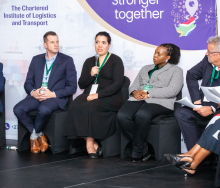Fruit industry exporters and Transnet are engaging at a strategic and operational level to improve efficiencies, specifically at the Port of Cape Town (PoCT), as the deciduous fruit export season ramps up.
Transnet announced in a joint statement with industry bodies, including Hortgro, the Fresh Produce Exporters' Forum and the South African Table Grape Industry, that it was holding weekly meetings to exchange information on expected fruit flows and the status of port operations, specifically during the peak of the stone fruit, table grape and early pear seasons.
“While the deciduous fruit industry is concerned about the physical flow of product through the PoCT in the coming season, at the most recent engagement Transnet management committed to better planning, sourcing additional equipment, on-site maintenance capacity and increasing availability of spares,” Transnet said.
Transnet Port Terminals shared progress on its readiness plans at the latest meeting and highlighted areas where the industry could assist it, while Transnet National Ports Authority (TNPA) presented its eight-point plan to improve efficiencies in the PoCT.
“TNPA provided updates on the eight focus areas which include: optimising the port as a delivery platform, combatting adverse weather conditions, improving truck operations, optimising marine services, improving information sharing and port operations visibility, terminal equipment and port infrastructure, people management, and managing the immediate crisis,” Transnet said.
Specific updates were provided on the acquisition of 16 additional shore tension units and their delivery, the dredging of the Cape Town Container Terminal (CTCT) berths, marine craft availability, shift rostering over the festive season, and the provision of credible port-related operational information.
CTCT and CTMPT (Cape Town Multi-purpose Terminal) reported on the number and availability of its teams and equipment, plug-points, plans for reefer and truck staging, gate shifts, the truck booking system, night runs and the use of the Belcon inland terminal, and reverting to a three-berth operation at CTCT and a two berth operation at CTMPT.
“We are hopeful that these interventions and plans will make a difference in the coming months and that we will experience logistical improvements. Industry also agreed to investigate mechanisms to contract and second maintenance capacity (mechanics and millwrights), and to investigate ways to fast-track the procurement of key pieces of equipment which is urgently required,” Transnet said.
It added that the cost and contractual arrangements for Transnet to use and reimburse this procured equipment still needed to be resolved.













